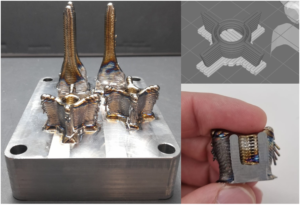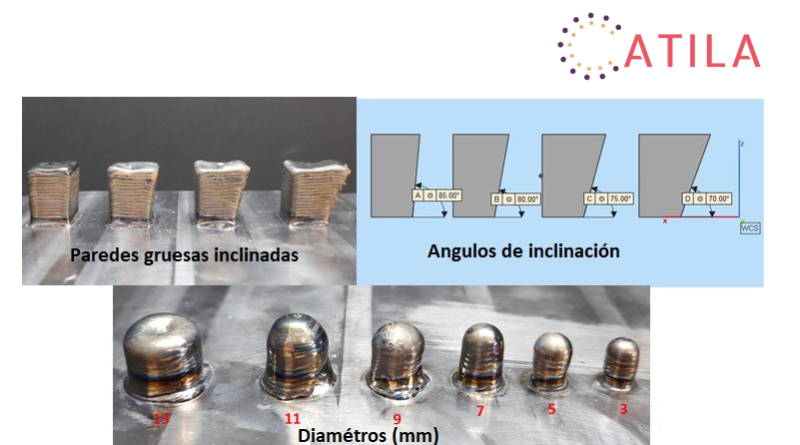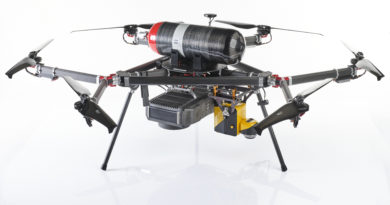ATILA Project researchers confirm that Meltio’s welding wire metal 3D printing technology successfully contributes to the creation of biomedical implants with titanium
- The initiative is part of the ATILA research project – funded by the Ministry of Science and Innovation and by the European Union and the State Research Agency – which is already giving its first results in our country. A multidisciplinary consortium led by AIDIMME with the active participation of the research foundation of the General University Hospital of Valencia FIHGUV, the research group of Laser and Photonics Applications of the University of Salamanca ALF USAL and the company MELTIO.
- The novelty is that for the first time welding wire is used (less polluting processes that generate less material waste) compared to other additive manufacturing technologies such as metal powder.
- The ATILA research project studies and develops a high-protection additive manufacturing process based on the direct deposition of metal by wire using multilasers for the processing of highly reactive materials
Valencia, January 15, 2025.- The ATILA research project has announced today another important technological advance, taking stock of the research carried out throughout 2024.
The Valencian research center Aidimme installs a prototype of 3D printing technology to create for the first time in Spain biomedical implants made of titanium alloys with the unique metal 3D printing technology developed by the Spanish multinational Meltio based in Linares (Jaén).
Progress in the ATILA project
The ATILA research project – funded by the Ministry of Science and Innovation and by the European Union and the State Research Agency – studies and develops a high-protection additive manufacturing process based on the direct deposition of metal by wire using multilasers for the processing of highly reactive materials. It is made up of a multidisciplinary consortium led by AIDIMME in which the research foundation of the General University Hospital of Valencia FIHGUV, the research group of Laser and Photonics Applications of the University of Salamanca ALF USAL and the company Meltio actively participate.
“To conclude and after the progress of the ATILA project research in 2024, we could assure that although there are already metal additive manufacturing technologies that use powder as raw material (PBF-LB/M and PBF-EB/M) and that allow the manufacture of implants in Titanium alloys, providing great advantages in the function of these products due to their high capacity to adapt to the patient, They also allow the implants to be provided with three-dimensional structures that favor the growth of bone in the patient. Thanks to the ATILA project, an implant manufacturing technology, known as DED-LB/M, is being developed that is fed by welding titanium wire; This fact can be an important competitive advantage by ensuring the quality of the implants produced. The focus of this technology is to be able to obtain preforms close to the final product, so that the amount of waste is limited compared to traditional machining starting from a block, here we see the importance of the project”, they say from the management of the ATILA Project consortium.
During the year 2024, research has continued, advances have been made in several aspects with the main objective of manufacturing biomedical implants that comply with regulations:
- The study has been carried out to know the geometric limitations of the DED-LB/M process when manufacturing parts with different complexities such as: different degrees of inclination or cylinders with small diameters of up to 3 mm. The maximum possible angle of inclination to be manufactured without sagging is found, as well as the minimum diameter to be manufactured when a wire diameter of 1 mm of Ti6Al4V is used.
- In turn, it has been possible for each manufacture to carry out thermographic controls with a camera that records the temperature at a specific point of each deposited layer, to then verify the microstructural and chemical composition characteristics.
The analysis of all this information that is being acquired will lead us to solve problems related to processing Titanium and its great affinity with oxygen, to meet the demanding requirements set by the regulations of the health sector.
- Study of the feasibility of manufacturing different demonstrators of biomedical implants, among which are: Cage without stem for bone graft (for shoulder), Distal radius plate (for forearm area), Cranial implant without screw system (for the skull) and acetabular implant (for the hip).
The Research Foundation of the FIHGUV General University Hospital has supplied the required implants (planes, STLs) to AIDIMME, where they have been modified in their geometry to adapt them to what is possible to manufacture with DED-LB/M technology, giving growth and making the necessary rounding. In the images you can see the preforms of implants obtained, these due to the precision required must be machined for use, this being the next stage where the machining and required finishes will be deepened.
- Study of mechanical and microstructural properties.
Currently, Ti6Al4V blocks have been manufactured in grades 5 and grade 23 to obtain specimens for mechanical tests and microstructural characterization, as well as heat treatments as necessary. In the coming months, this characterization/verification will be available and the manufacture of implants for the first in vivo and in vitro tests will be carried out by the FIHGUV.
- As part of the Dissemination Plan of the ATILA Project, the Spanish multinational manufacturer of metal 3D printing solutions for the industry Meltio has given a Webinar, attended by 82 professionals from the health technology sector connected under the title “Transforming Healthcare: First biomedical titanium implants 3D printed with the Meltio’s Technology Confirmation”.

In this Webinar, the ATILA Prototype has been shown, the chemical, thermal and microstructural characterization carried out to date has been shown, the manufactured demonstrators have been shown and the future challenges in the ATILA Project have been discussed.
This research project, formed by a consortium of different entities, investigates the different uses and applications of biomedical implants with Titanium, of the Ti64-ELI type, thanks to the unique metal 3D printing technology provided by the Spanish multinational based in Linares, Meltio. The main novelty is that for the first time in Spain the applications that can be created with this Titanium in 3D printed parts by welding wire technology are being investigated, which unlike other technologies such as metal powder to create 3D parts is much more efficient, with less polluting processes and that generate less material waste in its handling. thus contributing to reducing the carbon footprint of this technology.
The direct laser metal deposition (DED-LB/M) additive manufacturing process can build parts with the addition of raw material in powder or wire form. The advantages of DED-LB/M wired technology include a lower contamination process than when powder is used, a good deposition rate, a relatively low cost and a high use of raw material (close to 100%). When working with powder, it can be reused, but its chemical composition must be controlled, which varies after use. A very important issue in this process is the interaction of metal with oxygen, which can occur in highly reactive materials such as titanium.
During an additive manufacturing process there is a tendency to capture oxygen by the metal due to the increase in temperature during melting and subsequent deposition of successive layers; the oxygen content must not exceed the maximum limit established in the UNE-EN ISO 5832-3:2017 reference standards for implants. Surgical implants. Metallic materials. Part 3: Forged alloy based on titanium, aluminum 6 and vanadium 4, with a maximum oxygen value of 0.2% for Ti6Al4V grade 5 and 0.13% percent oxygen for Ti6Al4V ELI, a stricter oxygen limit in the ASTM F136-21 reference standard.

The use of coaxial melting shielding gas is characteristic of DED technology – which creates the part by melting the solid metal material creating the part layer by layer with Meltio’s 3D printer – to guarantee high material deposition efficiency and print quality.
About Aidimme
AIDIMME is a non-profit entity with private legal personality. AIDIMME’s origins date back to the 1980s when, on the initiative of the Business Sectors and the Public Administration, the first Research and Development Associations were created, set up to support companies in the most representative industrial sectors in their entry into the European Union. AIDIMME is a Technological Institute that is also registered as an Innovative Business Group (AEI), being an independent association, whose purpose is to contribute to increasing the competitiveness of companies, mainly in the field of product design and development, innovative materials, advanced and sustainable processes of supply, manufacturing, logistics, distribution and services, as indicated in its Statutes.

AIDIMME, which began working with additive manufacturing in 1997, has since helped companies learn about these technologies and choose the most appropriate solution. AIDIMME has been working since 2009 on the development of non-standard materials, from the design of the raw material, the obtaining of the processing conditions and the complete characterization required by the developed material.
AIDIMME has been collaborating with companies in the development of new additive manufacturing technologies thanks to a large multidisciplinary group in the world of additive manufacturing and in the development of custom machines. The experience acquired by AIDMME in the development of different European projects has promoted AIDIMME to be one of the benchmarks in the field, experience that is currently being used to help industrial companies to successfully implement additive manufacturing technologies. R+D Projects
Relevant: BIOMETAL, FUTURALVE, ULTRALIGHT, NANOTUN3D, TITAN, CUSTODIAN, CEFAM, 3DSOSTENIBLE and STRATA. AIDIMME has been distinguished as a “Cervera Center of Excellence” in relation to Additive Manufacturing. as part of the “Strategic Program for Training of Excellence in the Additive Manufacturing of Metal Materials (CEFAM)”
About FIHGUV:
The Research Foundation of the General University Hospital of Valencia (FIHGUV) is a non-profit organisation that, since 1999, has been carrying out multidisciplinary biomedical and clinical research using cutting-edge technology and collaborating with different agents of the innovation system with regional, national and international prestige (https://fihguv.es/). The Foundation manages the research of the General University Hospital Consortium of Valencia and its health department, always oriented towards achieving its objectives of promoting, promoting and developing scientific, health and biomedical research.
Its facilities have several laboratories equipped with the necessary technology to support research projects of the utmost relevance and promote new formulas with which to improve medical and surgical processes. It also has a Clinical Research Unit, a Scientific Business Innovation Unit funded by the AVI and a Simulation Centre for the training of professionals, as well as a television set to improve the dissemination of science and innovation carried out by researchers and medical professionals. With 35 research groups, he has published more than 1500 articles, 50 book chapters and 13 books, registering 18 patents and receiving 22 awards. In 2022, it secured funding for 54 competitive projects, a 12.5% increase from 2021. In innovation, the FIHGUV has led innovative projects, such as the first Chair of Robotic Surgery in Spain and collaborations with ITT and universities. The Foundation also hosts various structures of excellence such as research groups belonging to the CIBER (CIBER-ONC and CIBER OBN) and the new Biomodels and Biobanks Platform (SAIBSAL) of the Carlos III Health Institute.
About Meltio
Meltio takes metal additive manufacturing to the next level by developing and manufacturing high-performance, affordable, and easy-to-use metal 3D printing solutions using wire laser metal deposition (LMD) technology. The company’s mission is to delight customers, partners, and employees by pioneering the development of affordable metal 3D printing systems that are reliable, safe, and powerful, continuously reinforcing their status as disruptors. Meltio is revolutionizing the way metal parts are manufactured and repaired by achieving highly reliable results and extraordinarily dense parts with our additive manufacturing technology. Industries such as automotive, aerospace, oil and gas, mining, research centers, universities and others in more than 60 countries already enjoy Meltio’s solutions. Headquartered in Linares, Spain, Meltio develops and manufactures high-quality, disruptive products aimed at high-profile industrial end customers and R+D organizations such as universities and research-oriented companies. Today’s portfolio of metal solutions includes the new, more powerful Meltio M600 metal 3D printer with blue lasers, the Meltio M450 metal 3D printer, the Meltio Engine CNC integration, which turns virtually any CNC machine into a powerful hybrid manufacturing center, and the Meltio Engine robotic integration, which is the perfect platform for large and complex 3D printing, repair, coating, and addition of features. Another of the industrial solutions offered by the Spanish multinational is the Meltio Robot Cell, a closed and secure robotic cell that includes a standard ABB robotic arm to be able to 3D print larger and larger metal parts in different metal materials. www.meltio3d.com
About USAL:
At the University of Salamanca (USAL), a digital twin of the new titanium 3D printing prototype is being developed together with AIDIMME and MELTIO with laser welding wire technology and studying nanostructured ultra-short pulse lasers for the improvement of biomedical implants.




